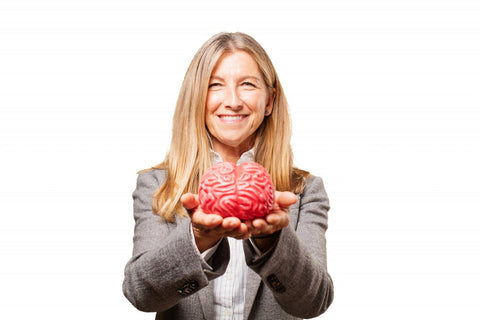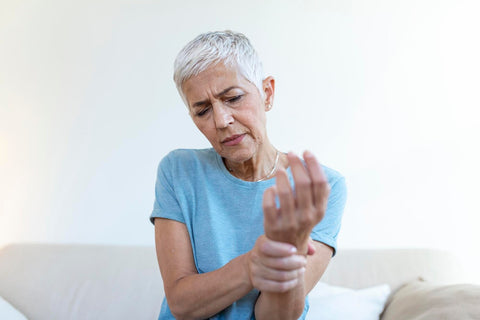How does menopause affect aging?
Menopause is marked by the disappearance of menstrual cycles and the end of fertile life, and this process is preceded by a few years of changes and symptoms caused by the decrease in female sex hormones, mainly estrogen and progesterone.
Estrogens play a role in many functions in our body in addition to controlling menstrual cycles, such as helping the proliferation of cells in different tissues, influencing some metabolic processes, preventing calcium loss, participating in fat metabolism, stimulating libido, intervening in collagen production, and their reduction increases the risk of suffering from cardiovascular problems.
And all this occurs between the ages of 45 and 55 , and coincides with a period in which changes caused by the cellular aging process begin to become noticeable, such as the appearance of gray hair, wrinkles, sagging, loss of muscle and bone mass...
The main changes linked to aging that are influenced by menopause are:
• Skin changes: Reduced estrogen causes a decrease in collagen production, which can lead to thinner, drier, less elastic skin. Wrinkles and spots on the skin may also appear.
• Bone changes: Decreased estrogen can contribute to bone density loss and increase the risk of osteoporosis by contributing to the loss of calcium, an essential mineral for bones.
• Increased cardiovascular disease: Decreased estrogen can negatively affect cholesterol and triglyceride levels and increase blood pressure, which can increase the risk of heart disease.
• Changes in metabolism: During menopause, many women experience changes that can lead to weight gain, especially around the waist. This can increase the risk of developing diseases such as type 2 diabetes or metabolic syndrome.
Tips to stay vital
Fighting overweight
Despite the hormonal and metabolic changes that occur during this stage, we must dispel beliefs such as that weight gain and menopause always go hand in hand or that it is not possible to lose weight. In general terms, the diet for women during menopause is no different from the recommendations that all people should follow at any age.
Weight gain during menopause can have serious health effects, and the accumulation of fat around the abdomen increases the risk of many health problems such as:
· Trouble breathing.
· Heart and blood vessel diseases.
· Type 2 diabetes.
Excess weight also increases the risk for several types of cancer, including breast, colon and endometrial cancer.
Do exercise
Physical activity is a fundamental pillar for the treatment of menopause, which has many advantages. Practicing physical exercise in a planned manner and integrated into daily life is essential at this stage of life. Above all, prioritizing strength training to preserve muscle mass and avoid becoming fragile.
Studies show that physical activity helps control appetite, improves digestion, weight control and increases agility, improves heart and bone health (it helps in their regeneration, a process that does not stop at any age). In addition, doing sports every day has a positive effect on mental health.
Foods and supplements that can help
Because estrogen levels decrease during this period, bone density may decrease and promote the development of osteoporosis.
Therefore, increasing calcium intake helps to keep bones healthy. However, calcium intake comes not only from dairy products (it is worth remembering that excessive consumption can raise cholesterol levels), but also from nuts and seeds (sesame, pumpkin seeds, sunflower seeds, etc.), whole grains, green vegetables (broccoli, spinach, chard, chicory, etc.) and sardines or small fish with bones.
To ensure that calcium is fully absorbed and deposited in the bones, it should be combined with foods rich in vitamin D, present in oily fish, eggs and brown rice, although the body produces this vitamin through exposure to the sun.
In general, it is advisable to increase the intake of red fruits, vegetables and green leafy vegetables, legumes, whole grains, nuts such as walnuts and seeds such as chia, as well as reduce the intake of foods with added sugars and saturated fats.
Whole grains
A diet Foods containing whole grains are also recommended for women going through menopause, such as brown rice, oats, rye, etc. They are useful for combating bone decalcification and are also slowly absorbed, so they will provide the extra energy that is needed.
Another healthy habit is to reduce, but not eliminate, coffee and alcohol consumption, and to avoid carbonated and sugary drinks due to their empty calories.
Like any balanced diet, food during menopause should contain the vitamins, minerals and nutrients necessary to reduce the problems generated during this stage.
Phytoestrogens
Red wine (not too much), soy, coffee, strawberries, nuts, seeds, oats, wheat, licorice tea and olive oil are all phytoestrogens, which are plant-based compounds that have estrogen-like properties. This is because their chemical composition makes them similar in structure to estrogen and they can therefore perform a similar function in the body. According to various studies, phytoestrogens help prevent osteoporosis and reduce hot flashes.
Increase protein consumption
Eating enough protein is essential, as it helps stabilize blood sugar levels, is satiating, and is crucial for the production of neurotransmitters.
Vitamin D Supplement
It is common to have a vitamin D deficiency, so it is recommended to take it through supplementation for proper bone health, especially at this stage. In addition, vitamin D has multiple benefits for the immune and cognitive systems.
Omega-3 Supplement
Omega-3 can be found in small, bone-rich blue fish such as sardines, anchovies, etc. It is true that the levels of omega-3 we need to obtain anti-inflammatory, cardiovascular, metabolic and cognitive benefits are high. This is why many doctors recommend supplementation with omega-3 to obtain all the beneficial effects that have been demonstrated.
Accepting the changes your body goes through during menopause can be helpful for your mental health, but you can reduce weight gain by changing your eating and exercise habits.
Commit to lifestyle changes and enjoy a healthier you.
References
The reality of weight gain during menopause. (2023, November 14). Mayo Clinic.
Barnaclínic. (2021, August 11). Estrogens: What are they, how are they produced, and what function do they have? Women's Health Blog.
Supplements in menopause. (nd). Quirónsalud.
García, I. (2023, July 3). What to take during menopause to avoid aging? Instituto De laMenopausia.
Montse, VIB (2016, July 1). Menopause: keys to coping with it. Professional Pharmacy.
Planas, C. (2024, March 7). Dietary recommendations for menopause - Your blog on aesthetic medicine and surgery - Clínica Planas. Your blog on aesthetic medicine and surgery Clínica Planas.




Comments (0)
There are no comments for this article. Be the first one to leave a message!